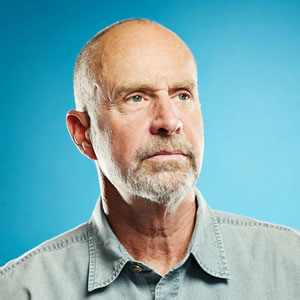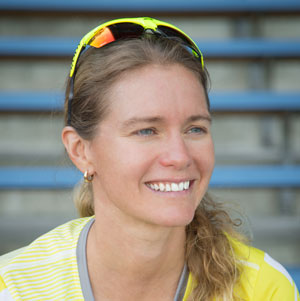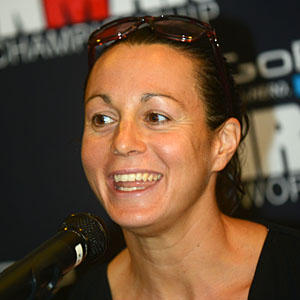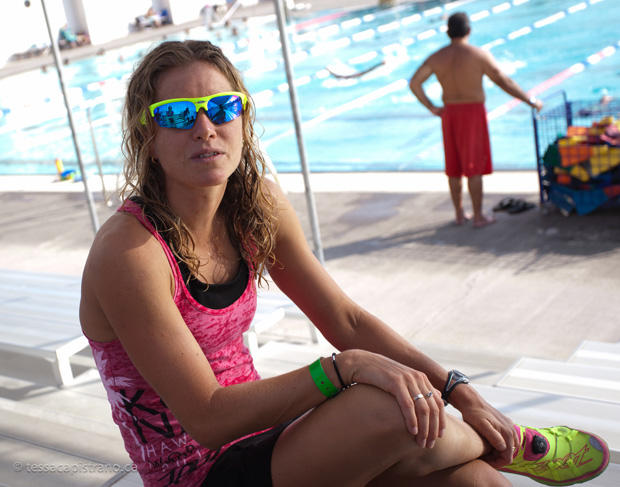Sara Gross Questions Empfield

A few weeks ago I was dragged down the rabbit hole with Dan Empfield when he tried to connect TriEqual to the individuals who called the feds regarding Ironman's illegal lottery. After numerous exchanges with Dan in the comments section, on the forum and in private emails, it occurred to me that one way out of Wonderland would be to shed a little light on Dan's views on equality in Kona, the need for diversity and who would make a better Czar.
As such I would like to present an interview with the Mad Hatter himself: Dan Empfield.
SARA: Hi Dan. Thanks for agreeing to be interviewed!
DAN: My pleasure.
SARA: Slowtwitch has recently come under fire as some parties feel you and your site are sexist and out of touch. I've been poking around the site a little and I have to say, I can understand why. For starters, do you have any women on staff who are paid? I understand that Karen Sing has been working with you for many years but she is not mentioned in your "About" section. I did find the following description of Tanya Williams who appears to be your wife? Her job description seems to be mostly about taking care of you:
"Tanya Williams Slowtwitch Business Manager: Tanya comes from a background as a technical writer but her chief tasks, beyond managing the office, are Social Secretary and Whip Cracker.
"Also among Tanya's duties are those that attend being Mrs. Slowman, so, the two horses, seven dogs, and one husband are fed, housed, made presentable to guests and visitors, and kept from barking and braying and otherwise annoying the neighbors."
Can you comment on that?
DAN: First, I don't think Slowtwitch has come under fire. For any of our readers who want to know where we, or I, stand on gender equality or issues, perhaps my answering your questions answers their questions. Aside from that, there is a cohort that just doesn't like us, never has, never will, it leverages opportunities presented to it and TriEqual has been a useful lever. That's all I'm going to say about that, and let's get to your question.
When I make payroll the gender split among those serving Slowtwitchers is, to the nearest digit, 55-to-45 percent, males the higher percentage. I don't think about gender when I hire. Maybe I should. Now, should we have more women expressing an editorial view? I think that's what you're asking. That's a valid question. What Herbert Krabel does for us now, he is the third to do this since I started Slowtwitch 16 years ago. The first two were women. When I sought someone to help readers understand the legal case against Lance, and in the volunteer lawsuit against Competitor Group, I could find no one more competent than TriEqual's own Kelly Burns Gallagher. I just look for the best person.
You mentioned my wife. If TriEqual and Slowtwitch ever do business, it's Tanya you'll be dealing with. She'll be sending you our invoice, or paying yours. She's also a real estate broker, so if you decide to move down our way let me know and I'll put you two together.
SARA: I have no doubt that your wife is a talented woman. What I would like to see on your "About" page then, are profiles of the women who make up the 45% of your payroll with descriptions of their various accolades in the same manner that yourself, Herbert, Jordan and others are profiled. Would you consider making this change?

DAN: We – I – have not updated our About page in a long time. I'm glad you brought it to my attention, because we are way out of date. Those joining Slowtwitch since its last update are predominantly women, and up on that page they'll go.
SARA: On a similar vein, I just clicked every link on your front page and only one article out of 36 is written by a woman. Can you explain that? Do you believe that a diversity of voices is required by media in order to present a variety of opinions?
DAN: When I go to a manufacturer's product launch, and all the magazines' tech editors are there, maybe 15 or 20, usually there's not a woman among us. I don't know what you do about that. As noted in my answer to your previous question, I had two of the best writer-editors working with me: Katherine Williams and Amy White, just as Triathlete has one of the best in Julia Polloreno. But, look, Slowtwitch is not going to become less-technically-oriented, less the pointy end of the spear. Technical swim articles? Yes, women will write for us about as often as men. Bike tech? We're going to skew male in who writes these articles.
I believe those 36 articles to which you refer were written by a total of 4 authors, 1 a woman, so we're 1-for-4. If Kelly writes for us again, which is always welcome – she's written numerous pieces for us – that would make us 2-for-5. Once this interview is published on Slowtwitch, as you are the interviewer, that would make us 3-for-6. So, your organization is already helping us make progress.
SARA. Why do you think so few women participate in your forum?
DAN: I don't agree with the premise in your question, but I'll get to that. Where opinions are shared online – comments sections of New York Times, for example – men outnumber women two- and three-to-one. Wikipedia's authors are 90 percent male. Reader forums can be brutal, accordingly a low percentage of women take part in them. This is typical of the genus Readerus-Forumus, our species included.
Plus our readers are overwhelmingly Ironman or half-distance specialists; plus 45 percent of our readers are not from the U.S.; plus we're a technically-oriented site. All of these data points skew male.

So that's the Slowtwitch reader forum and yet – to keep with the baseball analogy – I can make a strong numerical case for us batting above our average as regards female participation. Perhaps one thing that helps keep our women's numbers at their level is that we have a women's-only forum. I think women prefer a safe haven, hence the popularity of women's-only races, hence our women's forum.
SARA: Do you think that increasing participation rates is part of your job as the #1 website in triathlon? If so, how do you accomplish this? Does reaching under-represented groups interest you and if so, what strategies are you using to accomplish that?
DAN: Very good question. Let me see if I can dig myself a hole to China. I don't care what the percentage of women is in triathlon. I am more interested in access. What are the barriers to access? Can we identify them, pull them down, and then see what flows from our efforts? Right now, 60 percent of all participants in half-marathons in the U.S. are women. Do you see panic at the declining male percentage? No, because there is no access problem. If all barriers are washed away and women outnumber men in half-marathons 2-to-1, fine by me. If, when all barriers are washed away, women make up one-third, or two-thirds, of triathlon, fine either way.
This week I'm interviewing a very accomplished triathlete, articulate, knowledgeable, the very kind of person I like to interview and who is, besides the aforementioned, gay. A large part of my interview with him will be about access, and are there barriers we need to bring down? Whether gay participation in triathlon eventually makes up 2, 12, or 20 percent of triathlon's ranks, I'm fine with any number. What I do care about is doing my part so that triathlon is a safe haven and a compelling place for any sexual orientation. No, I don't think our job is to create a numerical mirror of a society's demographics. Yes, I think the work to pull down barriers to entry for any gender or sexual identity, minorities, old or young, wealthy or not wealthy, is central to our mission at Slowtwitch. I also take it as a personal mandate.
SARA: You make excellent points Dan. Would you consider then the idea that the technical focus of your website is a possible barrier for some women to both read articles and get involved in the forum? As such, could expanding Slowtwitch's repertoire help you accomplish the mandate of pulling down barriers for your site and also for the sport? And by repertoire, I mean both in content and journalistic voices.
DAN: I reject the premise that women are unequipped for technical discussion. But let's talk about women's voices because I think you're onto something. This week Eric Lagerstrom is answering questions on our forum about his win at Alcatraz. Couple of months ago it Jeff Symonds post-Melbourne. Brandon Marsh, Jordan Rapp, Thomas Gerlach, others. But not women, Helle Frederiksen the exception. We have not succeeded in getting women pros to do what these male pros so successfully do. Maybe this circles back to that difficulty women have with reader forums. I'll bet if pro women dipped into our women's forum that would be a treat for the ladies who congregate there. I have the platform, you have the women. Louie, I think this is the beginning of a beautiful friendship.

SARA: We have to have Paris first. And you should reject the premise that women are not equipped for technical discussion! But maybe there's room for a little more narrative, a little more inspiration – a little more girl power? While the rolling weight of the latest spoke is infinitely fascinating, is there not room and desire for more? Maybe not. I hope there is – and kudos to Helle for spending time on the forum. With regards to equal slots for the professional women in Kona, you stated the following in an interview with Rachel Joyce: "I'm sympathetic to the issue, but this isn't an ethical no-brainer. Reasonable people can see another side and I asked questions the other side might ask. Also, the space at Kona's pier is finite. These women aren't just asking for more slots, they're asking for someone else's slots." Do you really think that the professional women should continue to pay the price for the fact that Ironman has outgrown its championship venue?
DAN: There are a number of arguments made for equal slots on the pier. First is gender equality. I just reject that there is only one valid expression of equality. A pure Title IX application of equality is exactly what we have, right now, on that pier. That established, I don't think that is the only valid expression of equality. We have two competing expressions, TriEqual ascribes to the other, and I'm angry at anyone who shouts down an interlocutor who advocates for a different expression of equality. Ideas exist in tension. Respect the tension. No, I don't think TriEqual can righteously say that anything other than 50 slots is unfair without granting the other side the dignity of its opinion.
The second argument: The extra 15 pro women will serve as a model to other women. TriEqual hasn't made that advocacy case to my satisfaction.
Third argument: It's a world championship, and as such the field should be equal. Bingo. That's it. And that's my reason why there should be equal gender representation among the pros. But this opens up the question of what is the precisely correct number of pros, as well as the size and depth of the purse and other considerations. That's a discussion worth having, at least among affected stakeholders.
There is one more argument: I wouldn't like to see the pro women outnumber the pro men just through a surge in female age group entrants, if the competitiveness past the 20th or 25th pro place, male and female, were to remain as it currently is. If this reticence I sense in myself is shared by others, this ought to be part of the calculus of this discussion.

SARA: In a later opinion piece you state; "Do I believe the pro field should be gender-equal in Kona? Yes, because I ask myself what would happen if the women engaged in a robust effort to attract new Ironman Pro members, so that the women pros outnumbered the men 3-to-1. Would I be willing to adjust numbers, placing 60 pro women and 20 men on the starting line? Yes I would in the age group field, but not in the pro field. Sauce for the goose is sauce for the gander. Intellectual honesty, if nothing else, requires me to stand on the side of gender equality on the pro start line in Kona." Is intellectual honesty the only reason you feel the field should be gender-equal? Do you see the philosophical and moral reasons for equality that could have long lasting effects on our sport and our culture?
DAN: When you use the phrase "moral reason for equality" implicit in that, I think, is the view that your version of equality is the only moral version and I think this causes others to stumble. But can we talk about equal slots? Nobody has yet made me the Czar of Kona. But if I was, pro slots would be equal. But not necessarily 50. There's nothing magic about 50. Maybe there ought to be 75 pro men and women on that pier. Maybe 25. The correct number ought to be an agreement among stakeholders, and I'm not a stakeholder. The Ironman corporation, pro men and women, and age-group men and women, are the primary stakeholders. There are plenty of reasonable people in these cohorts, and you all should be able to sit down and arm wrestle and hash this out and, honestly, shame on you all if you can't.
SARA: That's a good answer. Maybe you should be the Czar – actually I think I'd better have that position. You can be the Rasputin of Kona. I tend to agree with you that the best case for having equal numbers lies in the fact that we are talking about a World Championships. But don't you think that the total number of pros in Kona is a separate issue with separate components such as how deep the money goes and the qualifying system itself? Entangling all these issues seems to be part of the problem. I think the request for equal numbers should stand alone and be met on its own terms.

DAN: I'm sympathetic, but I'm wired more toward pragmatism than ideology. Why not just end-run the stand-off between a pair of legitimate theories of equality, hurt no one's feelings, break no China, in a low-risk, high-reward way to achieve equal numbers through the world championship argument? If what you want is equal numbers, okay. If you just want to win, and you're willing to die taking that hill, also okay. You have to decide which you want most.
SARA: TriEqual recently launched a Fair Starts initiative in an effort to make the professional women's races fair, especially on the bike. This is a topic you have covered many times over many years. What is your solution to the problem of the women's race being affected by both the slower pro men and the fast age groupers?
DAN: In my opinion the best tool for use against this problem was put forward some years back by Murphy Reinschreiber, which was a moto, in front of which exists pro rules, behind which exist age-group rules. That moto sits just behind the last competitive pro woman. Any male in front of that moto now lives with the pro draft zone. A female pro behind the moto now lives with the age-group zone and rules. This means there is one standard for the entire race, instead of two races in proximity to each other, one encumbered by a more stringent draft rule than the other. This helps. But, yes, the women pros have also to have a proper gap between waves.
Just, in Ironman Texas the male pros left at 6:25am. How early would you have them leave? How late the age-groupers? Many are affected by leave times and intervals, including volunteers and the host community. So, for 25 years I've been fighting that battle of the age-group men affecting the women's pro race. I could tell you stories. We're in solidarity here. I just think that the right solution has to honor all affected stakeholders.
SARA: Agreed!
[Notes: The photos just above, left, is of Sara Gross. All other photos are Dan Empfield variously with wife Tanya Williams, speaking at Interbike, and with dog Sunny. Sara Gross, PhD, is a multi-time Ironman champion from Canada, she's a coach, and she's president of TriEqual.]



